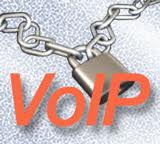 Business security should always rank high on a company owner’s list of important needs, for without it, businesses can see all they have built up come crashing down in a short matter of time.
Business security should always rank high on a company owner’s list of important needs, for without it, businesses can see all they have built up come crashing down in a short matter of time.
With that the case, businesses that deploy Voice over Internet Protocol (VoIP) want to make sure that their service is not only efficient and cost-effective, but also secure.
For those company owners who may not yet be dialed-in, VoIP for businesses offers them a number of potential advantages, some of which include:
- Better production – With VoIP, your small business can see an uptick in not only production geared towards customers, but also with your employees. If operating a customer service call center at your company, you can deal better with a larger number of clients. You can also keep more employees in the loop via VoIP, meaning those that travel for their jobs or telecommute can teleconference with you on a regular basis;
- More money – Given the importance of saving money in today’s economy, business owners will like the fact that VoIP proves cheaper over the long haul than regular phone service. This factor especially holds true when it comes to long distance calls;
- Growth down the road – Finally, many small business owners are always open to growth if it makes sense for their company. With VoIP, you have the ability to expand your communication efforts, as you can add phone lines, extensions, and other necessary communication features to increase the outreach of your company.
So, with VoIP potentially sounding good to some business owners looking to be more efficient and save money in the New Year, are there security concerns with such a product?
Like any product or service, there can be security issues if things are not properly orchestrated, especially if you choose a low-cost provider. Two such problems would be:
1. Eavesdropping – Just as you would not want your private personal calls to be listened in on, having important business discussions with unwanted parties is not good either. Someone listening into your calls that is not approved to do so could swipe business secrets, including key financial data. Someone could use the opportunity to place calls via your Virtual PBX, meaning they tapped into your private branch exchange;
2. Denial-of-Service (DoS) – This involves matters like spam over Internet Telephony, along with business disruption such as viruses or spyware slowing down your electronic communication means. When such matters occur, the IP telephony system becomes useless to users.
In order to lessen the chances of either of these problems surfacing with your VoIP service, consider:
- Never scale back on security efforts, making sure they are updated constantly;
- Put in play encryption internally with your unified communication traffic;
- Do not overlook potential pitfalls when using SIP trunking;
- Avoid potentially damaging websites.
With all that your small business potentially has to lose if your VoIP security is compromised, are you dialed-in to keeping things safe?
Photo credit: ncs.net.au
About the author: Sara Fletcher covers small business topics for various websites.
























Leave a Reply